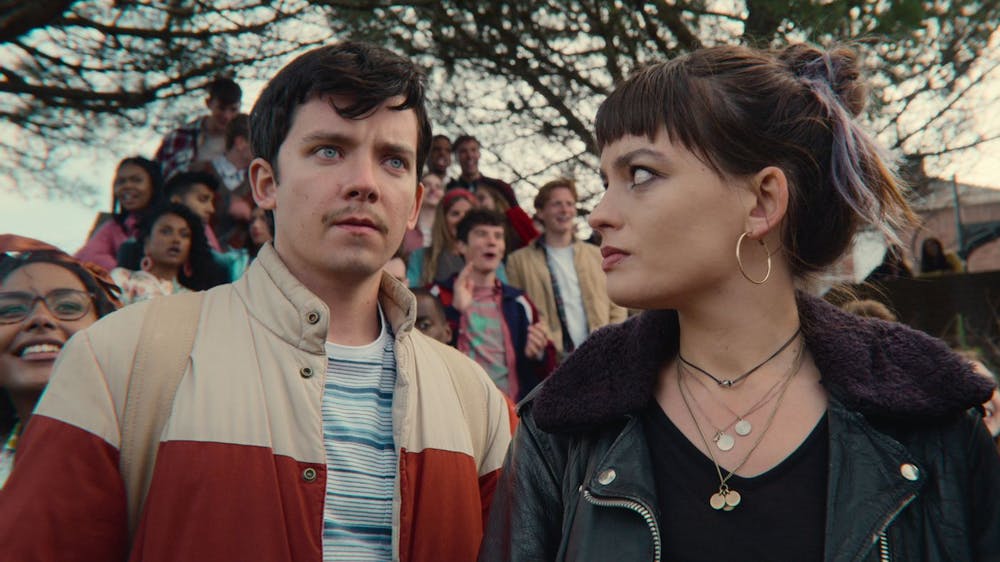The third season of Netflix’s “Sex Education” opens in a way you’d expect from the title: a lot of people having sex. This rather graphic opener sets the tone for a season about sex positivity with some characteristically raunchy humor that leaves audiences pleasantly surprised by the tumultuous season to come.
While “Sex Education” lives up to its name by discussing a variety of issues around sex and sexuality, the heart of the show lies in its relationships— sexual or otherwise. In fact, the best relationship in the show goes to best friends, Maeve and Aimee. Whether it's checking in on each other or naming themselves “each other’s mums,” Maeve and Aimee’s relationship was definitely a highlight of the season. One of my favorite moments between these two was their makeup in Episode 7, when both apologize for the hurtful things they said to each other in the previous episode and instantly forgive each other. Normally, that instant forgiveness bothers me because it doesn’t seem earned; however, the platonic love they have for each other is so well-established that it is entirely believable that they are able to makeup after an argument that quickly.
Maeve and Aimee’s friendship works so well because they communicate with each other. Healthy and unhealthy communication in all manner of relationships are major themes in the season. One of the most important examples of healthy communication is when Maeve and Isaac get together in Episode 4 (despite one of the worst examples of unhealthy communication being Isaac’s failure to tell Maeve about the deleted voicemail until after she kissed him). Because Isaac is physically disabled, Maeve isn’t entirely sure how to navigate sex with him and is scared to ask. Fortunately, Isaac breaks the ice by telling her, “If you put your hand on my chest, I’ll show you [what I can feel.]” From there, Maeve asks if she can take his shirt off, and Isaac follows up by asking where Maeve wants to be touched.
The scene is a little flirty, a little awkward. Most importantly, it centers mutual consent as something both beneficial and sexy for both parties. Another great example is when Jackson and Cal decide not to pursue a romantic relationship with each other. Although they both admit to liking each other romantically, and much of the season focuses around their developing relationship, Jackson comes to the conclusion that “I just don’t think I’m queer” and that he still sees Cal as female even though they’re non-binary. The maturity in this scene is so refreshing. Cal and Jackson each communicate their expectations and boundaries for a romantic relationship. They recognize that those expectations and boundaries don’t line up, so they part as friends instead of trying to force themselves to be a couple, which would inevitably end in a bitter break-up.
Hope’s new sex education classes are masterclasses in unhealthy communication. Besides only catering to heterosexual relationships, the new curriculum demonizes sex and focuses on scaring teenagers into being abstinent rather than teaching them how to have sex safely. The most ludicrous element of these classes is the prohibition of any questions students might have. Hope’s version of sex education communicates harmful stereotypes and actively discourages dialogue among students and between students and teachers. Obviously, not every teenager is sex-obsessed, but those interested in having sex should have access to the pertinent information so they can be safe and have fun.
Let’s talk about Hope. When she is introduced in Episode 1, I instantly pegged her as this season’s big-bad — but that is because I have seen and read a lot of YA fiction. For the poor, unsuspecting students of Moordale, their new headteacher represented exactly what her name suggests: hope for a better term, hope for more acceptance from themselves and others, hope for… Instead, with each new restriction imposed, hope dwindled. Hope herself became stricter and less empathetic as the season wore on, probably in large part due to her own fading hope of being a biological mother. A particularly harsh moment is when Hope tells Vivienne: “The quicker you and your fragile, petty little peers realize that you’re not that special and that the real world doesn’t care about your supposed issues, the better.” While any teenager will immediately reject this claim as the insensitive rantings of a quintessential YA antagonist, we get more context for Hope’s perspective later in the season, when we discover that she has been trying unsuccessfully to get pregnant. In the last episode, she admits to Otis that “my body won’t do the one thing it’s supposed to do.” When she said that, all the rage I felt towards her was instantly replaced with pity. Clearly she’s never had the sex education her students (and, I would argue, every student) desperately needs. Students need a sexual education that doesn’t merely address mechanics or employ scare tactics to encourage abstinence; we need sexual education classes that destigmatizes sex as a whole.
I’d like to end this deep dive with Joy. Although she has no dialogue and less than five minutes of screen time, Jean’s newborn daughter Joy is a pivotal character in this season. Her conception causes tension between Jean and Jakob, which in turn causes tension in their blended family. Her delivery motivates other characters to reflect and reevaluate. Her existence juxtaposes Hope and Jean, as women and as caregivers. Finally, her name summarizes the show’s overall message about sex and relationships. Baby Joy is literally the product of a pleasurable act, even though not all babies are. Engaging in interpersonal relationships, including sexual relations, should bring joy. Additionally, her name is inspired by something Jakob tells Ola before the baby is named: “You remind me of joy.” Giving birth to Joy, literally and figuratively, takes work; however, the work is worth it.
Get The Chronicle straight to your inbox
Signup for our weekly newsletter. Cancel at any time.

